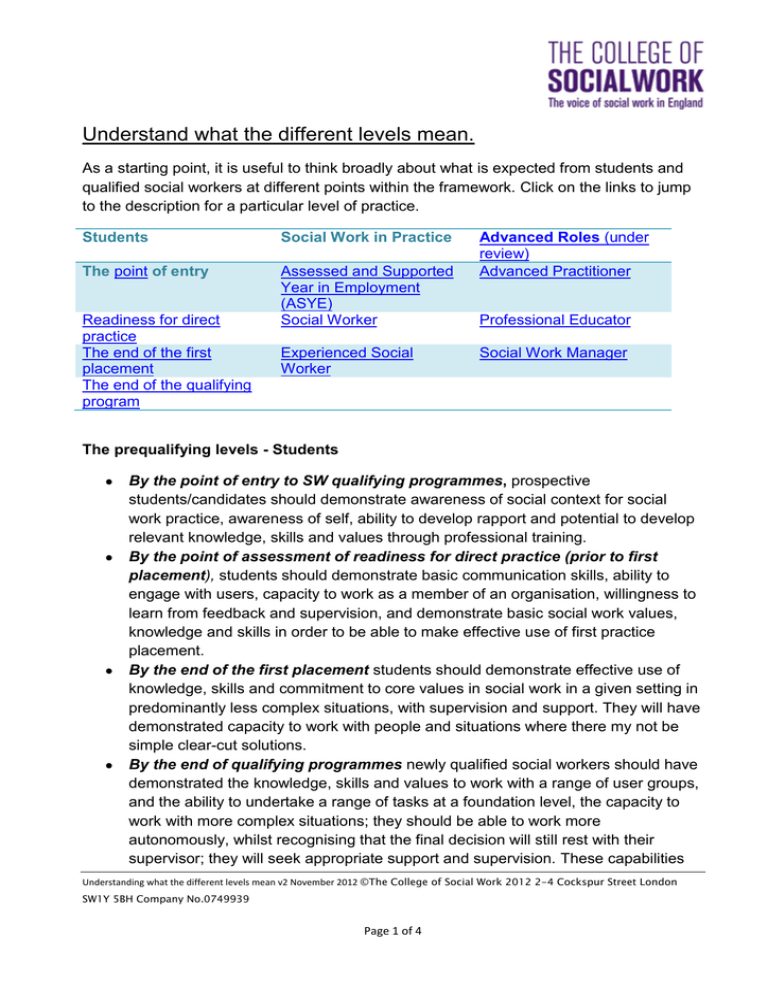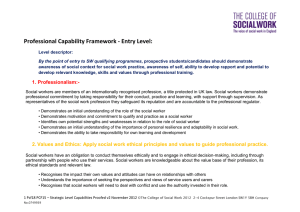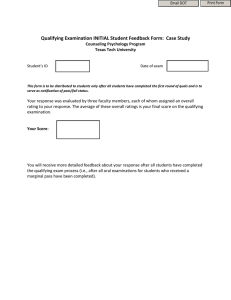Understanding what different levels mean in the PCF
advertisement

Understand what the different levels mean. As a starting point, it is useful to think broadly about what is expected from students and qualified social workers at different points within the framework. Click on the links to jump to the description for a particular level of practice. Students Social Work in Practice The point of entry Assessed and Supported Year in Employment (ASYE) Social Worker Readiness for direct practice The end of the first placement The end of the qualifying program Experienced Social Worker Advanced Roles (under review) Advanced Practitioner Professional Educator Social Work Manager The prequalifying levels - Students By the point of entry to SW qualifying programmes, prospective students/candidates should demonstrate awareness of social context for social work practice, awareness of self, ability to develop rapport and potential to develop relevant knowledge, skills and values through professional training. By the point of assessment of readiness for direct practice (prior to first placement), students should demonstrate basic communication skills, ability to engage with users, capacity to work as a member of an organisation, willingness to learn from feedback and supervision, and demonstrate basic social work values, knowledge and skills in order to be able to make effective use of first practice placement. By the end of the first placement students should demonstrate effective use of knowledge, skills and commitment to core values in social work in a given setting in predominantly less complex situations, with supervision and support. They will have demonstrated capacity to work with people and situations where there my not be simple clear-cut solutions. By the end of qualifying programmes newly qualified social workers should have demonstrated the knowledge, skills and values to work with a range of user groups, and the ability to undertake a range of tasks at a foundation level, the capacity to work with more complex situations; they should be able to work more autonomously, whilst recognising that the final decision will still rest with their supervisor; they will seek appropriate support and supervision. These capabilities Understanding what the different levels mean v2 November 2012 ©The College of Social Work 2012 2-4 Cockspur Street London SW1Y 5BH Company No.0749939 Page 1 of 4 will have been demonstrated through the last placement together with the final assessment of other work in the qualifying programme The PCF as a qualified Social Worker/Experienced Social Worker By the end of the ASYE social workers should have consistently demonstrated practice in a wider range of tasks and roles, and have become more effective in their interventions, thus building their own confidence, and earning the confidence of others. They will have more experience and skills in relation to a particular setting and user group, and have demonstrated ability to work effectively on more complex situations. They will seek support in supervision appropriately, whilst starting to exercise initiative and evaluate their own practice. In the Social Work role they progress to practice effectively, exercising higher quality judgements, in situations of increasing complexity, risk, uncertainty and challenge. Through growing understanding they expect and anticipate, but do not pre-judge, the issues that may develop. They have greater confidence and independence (whilst accessing support when needed), and use their initiative to broaden their repertoire of responses; they have expertise in one or more areas of practice, be familiar with local resource networks and be recognised by peers as a source of reliable knowledge and advice. Experienced (Senior ) social workers are more autonomous in their role. They demonstrate expert and effective practice in complex situations, assessing and managing higher levels of risk, striking a balance between support and control, liaising with a wide range of professionals, including more senior levels. They manage complex caseloads, and offer expert opinion within the organisation and to others. They chair a range of meetings, offer expert support to case conferences, and produce high quality assessments and reports for a range of functions. They model good practice, setting expectations for others. They start to take responsibility and be accountable for the practice of others, mentoring newly qualified social workers, and supervising the work of junior staff. They undertake capacity-building with individuals, families, communities, user groups and voluntary organisations, and contribute their views on service provision to commissioners. The terms in brackets are those used in the SWRB One Year On Report Understanding what the different levels mean v2 November 2012 ©The College of Social Work 2012 2-4 Cockspur Street London SW1Y 5BH Company No.0749939 Page 2 of 4 The PCF at an Advanced Level The level descriptors at the advanced and what will be the ‘senior’ level within the PCF are under review, and are likely to change in response to consultation At the next (advanced) career level, three pathways are available: Advanced Practitioner, Social Work Manager and Professional Educator (Practice Educator ). The three pathways, or areas of expertise, whilst distinctive, will not be mutually exclusive, and many social workers will wish to develop capabilities across the three pathways, reflecting their expected career progression. In different ways, all social workers at this level engage in the development of evidence-informed practice, quality assurance, staff development, management and leadership and they contribute to strategic development. Advanced Practitioners have their practice with a specified user group recognised as exemplary, and provide leadership and professional wisdom to their colleagues and other professionals for work in situations of high complexity. They provide constructive challenge to enhance practice, procedures and policies, promote innovation, and introduce new ways of working from recognised sites of excellence. They contribute to knowledge in their field of practice, and make use of sophisticated, critical reasoning. They both model and facilitate reflective practice. Professional Educators facilitate the learning of others (students on qualifying programmes, those in ASYE and those undertaking CPD ), enabling them to develop their knowledge, skills, values and practice. They support and develop other practice educators in their work, and identify and resolve difficult situations in respect of learning and practice development. They positively mange the interface with providers of education and training, by contributing to arrangements for selection, curriculum delivery, assessment and evaluation. They will be able to draw on contemporary research practice and best educational practice. They contribute to workforce development strategies in the agency. Social Work Managers lead, motivate and manage a team (social workers and others), ensuring the service provided is effective, managing performance and quality assurance, resources and budgets appropriately, in collaboration with others in the agency and in other professions. They are knowledgeable about management within the public sector and in social work; contribute to the development of practice, procedures and policy and specifically the professional development of the team they lead. They are accountable for the practice of others Understanding what the different levels mean v2 November 2012 ©The College of Social Work 2012 2-4 Cockspur Street London SW1Y 5BH Company No.0749939 Page 3 of 4 and provide effective supervision, mentoring and coaching to enhance the quality of practice, undertake performance appraisals and investigate complaints. They will ensure team experience informs the wider organisation, and other service providers, and vice versa. Understanding what the different levels mean v2 November 2012 ©The College of Social Work 2012 2-4 Cockspur Street London SW1Y 5BH Company No.0749939 Page 4 of 4


